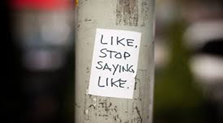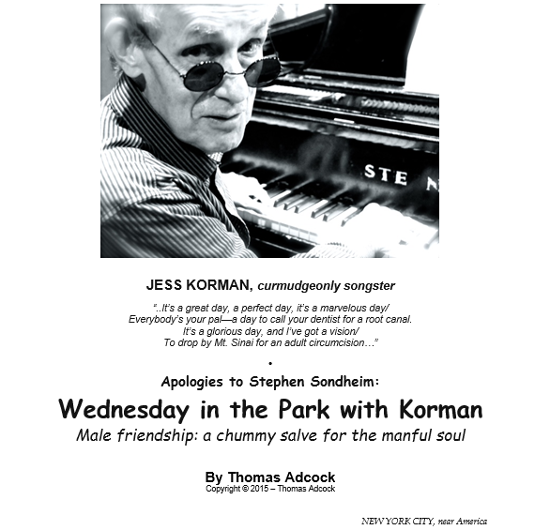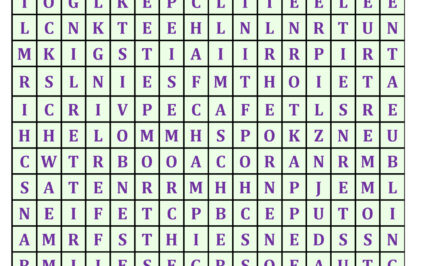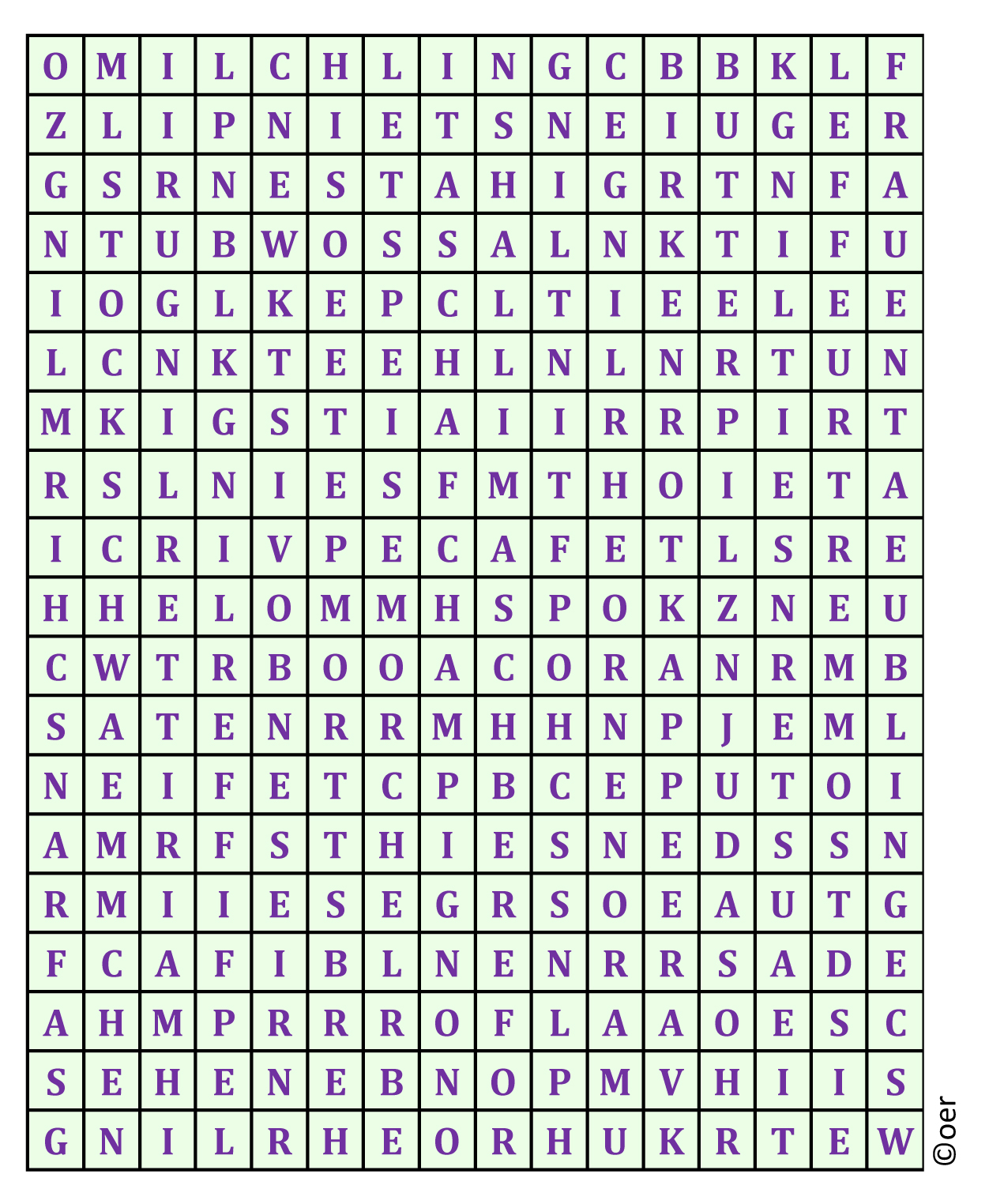As we know from the mountain range of sociological studies on the topic, men have a hard time making friends with their fellow men. This is especially true for white, heterosexual men; doubly true for shamrocks like myself, warned since our days in short pants to beware of the Dread Emotional Talk.
Counsel thus given to a nascent borstal boy:
No girly talk for thee, Tommy-boyo. None of that missy-missy, passion-soaked palaver. No siree! You must keep the chatter he-man, laddy-buck. Football and motorcars and power tools—that’s the stuff. Unless you’re made of finer stuff, I secretly thought.
—What put me to thinking of man-to-man strictures of yore was a fine and sunny Wednesday the other week when my buddy Korman and I reconnoitered in Central Park. We two are gentlemen of a certain age, of an evolved aesthetic, and of the occasional crosspatch pose: Jess Korman the curmudgeonly songster, myself the scrivening malcontent.
For an hour, thereabouts, Songster and Scrivener strolled the cinder-strewn perimeter of the Central Park reservoir, rarely speaking of athletics or automobiles or macho whatchamacallits. Rather, we spoke of more elevated things: books and movies and philosophies. And of artistries—fully leafed London plane trees, the attractive new wrought iron railing that hugs the reservoir, and aphorisms that help make sense of the American Zeitgeist. Of the latter, my favorite from the German poet Johann Christoph Friedrich von Schiller (1759-1805): “Folly, thou conquerest, and I must yield! Against stupidity, the very gods Themselves contend in vain.”
We talked of boyhood, too.
Summers at sleep-away camp in the Catskill region upstate New York, according to Korman: “The other guys out playing ball in the sunshine every day, they turned brown as berries. Me? I worked backstage at the little music hall theatre, writing things for the follies. I was as pale as a Hasidic scholar.”
I acknowledged having played all sports, save for basketball (too short) and golf (too plutocratic). We care little for sports, Korman and I, though I confess to the pleasures of watching a baseball game on a sweltering August afternoon. In sports, I have excelled only at racquetball. (Korman calls it squash, which is only half correct. I hipped him to the distinction: racquetball as blue-collar squash.) My bouts as a boxer were entirely hopeless: I felt sorry for the other guy.
It was a great day, that Wednesday in the park with Korman. But not in the black humorous way suggested by Korman’s grumpus lyrics. No, the day was something primordial: a chummy salve for the manful soul. As the Scottish novelist Andrew O’Hagan put it, “A woman may represent a man’s better half, but his friends are his other self. Whether they involved arguing, competing, or doing nothing much at all, male friendships are elemental.” Mr. O’Hagan, in a March 2013 article for the New York Times, further observed:
Occasionally, a man has no choice but to consort with his own kind. No amount of socialization, and no number of baby manuals, mortgages, or prams in the hall can alter the act that when men get into the open air, they tend to fly like starlings, turning this way and that by some collective instinct.
*
An unfortunate sight crosses our path: a young man and woman at the friskiest phase of life, absorbed not in one another but in their respective battery-powered contraptions. Which naturally reminds me of another number from Korman’s œuvre. From his latest on compact disc, “Let’s Rob a Liquor Store”—
Hello young lovers whoever you are, I’m here and looking at you.
You think that you’re connecting, but you’re somewhere else in space.
Cruising on your smart phone, not a musing on her face/
Tapping into worlds you’d rather be in/
Linking to your YouTube videos/
Posting, texting, tweeting all your several thousand friends/
Ignoring someone right before your nose.
You crave your information, breaking news, the scores, the maps/
Someone’s breathing there beside you, you’re just fondling your apps.
See the two of you in parallel isolation/
Split by password, firewall, and barrier/
So caught up in the journey to that Google in your brain/
Now all you have in common is your carrier.
Your universe gets larger, better disconnect
your charger.
How sad it is to see what love becomes/
When the only thing that’s moving is your thumbs.
Then something comes within view to refresh the soul, and certainly the ears, of anyone who loves the elegance and clarity and inventiveness of the English language, American-style. It gladdens my heart to see this sign pasted to a pole:

In the autumn of 1992, when the younger and more impressionable of my countrymen began parroting the syntax of Southern California’s dim-bulb Valley Girls, it happened I was in London. One morning, there appeared a disturbing headline over an article in The Times: ARE AMERICANS, LIKE, STUPID?
Fast forward to present day America, where the assault on spoken English is multi-generational. Fewer and fewer words mean more and fuzzier things. What began with “like” as dopey introduction, moronic interpolation, or statement of mood has grown to near autistic repetition of the words and phrases “whatever,” “you know,” “at the end of the day,” and “it is what it is.” Americans of all ages seesaw from overstatement to inane modification. The formerly ordinary is now “awesome,” or sometimes “a-may-zing,” and mundane accomplishments—e.g., presenting a dollar bill in payment for a store item costing the very same—are pronounced “perfect.” We “kinda” or “sorta” achieve or discover that which has obviously been achieved or discovered; we interject “you know” when people ask questions to which they do not know the answers.
For many years, I knew joy in eavesdropping on the sidewalks of New York. Unashamed intelligence was then fundamental to the snappy lingo. I once overheard a Manhattan cop proudly say, “I’m half-honest in a city that’s three-quarters crooked.” I overheard one half of a gay couple excoriate the other, “Lose the attitude, sugar. Only a woman would want you.”
No more jewels like these. Certainly nothing so gorgeous as a philosophy for life espoused by the late, great baseballer Leroy “Satchel” Paige (1906-1982): “Work like you don’t need the money, love like you’ve never been hurt, dance like nobody’s watching.” As the terminally adolescent would say of today’s sidewalk jabber, “Eyes like—it toadily sucks, y’know?”
 I tell Korman that I have found an antidote to infuriating locutions that grind away at my sensibilities: a marvelous application for my smarty phone—Pandora. This merciful innovation allows me to assemble musical medleys of my choice, by genre or artist, turning them into virtual radio stations. The service is free of charge, in exchange for infrequent and blessedly soft-spoken advertisements that ask mere seconds of my time. And so, even as I dance ‘round the rim of droolery, I am one of those New Yorkers seen with ear buds wherever they go; in my case, ear buds plugged into Pandora for my choices of pleasant jazz, soothing orchestral classics, and pop tunes from a distant youth.
I tell Korman that I have found an antidote to infuriating locutions that grind away at my sensibilities: a marvelous application for my smarty phone—Pandora. This merciful innovation allows me to assemble musical medleys of my choice, by genre or artist, turning them into virtual radio stations. The service is free of charge, in exchange for infrequent and blessedly soft-spoken advertisements that ask mere seconds of my time. And so, even as I dance ‘round the rim of droolery, I am one of those New Yorkers seen with ear buds wherever they go; in my case, ear buds plugged into Pandora for my choices of pleasant jazz, soothing orchestral classics, and pop tunes from a distant youth.
I explain to Korman, “Now I don’t have to kill people due to the idiotic things they say. I simply no longer hear them.” Korman is unsympathetic to what I have told him pounds through my head like nails.
“Next thing you know,” he sniffs, “you’ll be asking for actual sentences.”
During this remark of his, we are sitting on a bench, post-trek. Like a couple of aged cub scouts, we’re having lunch, which we’ve brought along in respective brown paper bags. Midway through a bite of my tuna and pickle sandwich, I consider punching Korman. How can this man of high-wire imagination and verbal dexterity not sympathize with my dependence on Pandora?
I decline to punch him. But not because Korman is slight of build, whereas I am of broad shouldered peasant stock. I decline because of Andrew O’Hagan’s fond remembrance of a spat about something or other with his dear friend, the late Anglo-American journalist and literary critic Christopher Hitchens (1949-2011).
“The more we argued, the closer we got,” wrote Mr. O’Hagan in the aforementioned article. “The more I wanted to punch him, the more likely it seemed we would hug—which we did, pathetically, whilst swinging a bottle of Johnnie Walker Black.”
 Korman is oblivious to my assaultive mood, and lucky that I recollected the O’Hagan article. With a sweep of his arm, he commands me to savor the sight of lushly new grass that carpets the Great Lawn of Central Park, stretching out before us as we dine. This is one of Korman’s favored sections of the park, especially at springtime when it’s full of pretty young sunbathing women. Which he enjoys inspecting, “purely for scientific purpose,” as he says.
Korman is oblivious to my assaultive mood, and lucky that I recollected the O’Hagan article. With a sweep of his arm, he commands me to savor the sight of lushly new grass that carpets the Great Lawn of Central Park, stretching out before us as we dine. This is one of Korman’s favored sections of the park, especially at springtime when it’s full of pretty young sunbathing women. Which he enjoys inspecting, “purely for scientific purpose,” as he says.
He says just now, “Isn’t this great, Tom? I mean, really, would you want to live anywhere but right here in New York?”
*
On my walk back home from the park, I swing by a certain bakery and delicatessen. It is glutted with out-of-towners, for the tourist high season is upon us. I share with Korman a disdain for the latest of Manhattan’s permutations: a museum for tourists. And I dislike standing on line with people who say in line. Nevertheless, I consider stopping to buy tomorrow morning’s bagels for my bride and myself.
Out of respect for Korman’s aggrieved view that deli standards have slipped a bit, in part because of tourism, I think twice. (I have seen bagels that come with bacon and a ghastly yellow concoction known as American cheese. Seriously.) As the Songster expressed it—
 This they call a bagel? This they call a bialy?
This they call a bagel? This they call a bialy?
These I wouldn’t serve them to the homeless in an alley/
This is not smoked salmon, this is not real novae/
This is more like what you’d call a leftover anchovy.
This is not stuffed derma, Irma—twenty bucks it comes ‘ta/
This is not salami, Tommy—throw it in the dumpsta.’
This they’re calling kreplach? This they say is challah?
I would never take a sniff, forget about a swawlla.’
This is not a latke, this is not chopped liver/
For a meal like this they should assassinate the giver.
These are not gefilte, Hilda—take ‘em and destroy ‘em/
This ain’t mushroom barley, Charlie—serve it to the goyim.
This they call a counter? This they call a menu?
Pardon me, I think that I shall have to change my venue/
For if I’m eating tref like this, you’ll find me with the old codgers—
Dining out at half the price at Wendy’s and Roy Rogers.
So I do not buy the tourist-friendly bagels. I continue homeward instead, confident that I am behaving as the better man; after all, I have sympathized with Korman’s lament, never mind how he dissed my own.
I may bring this up when next we two gents stroll through the park. It may inspire a spat, but such is the price and the prize of friendship with one’s other self.
Thomas Adcock
Thomas Adcock is America correspondent for CulturMag












